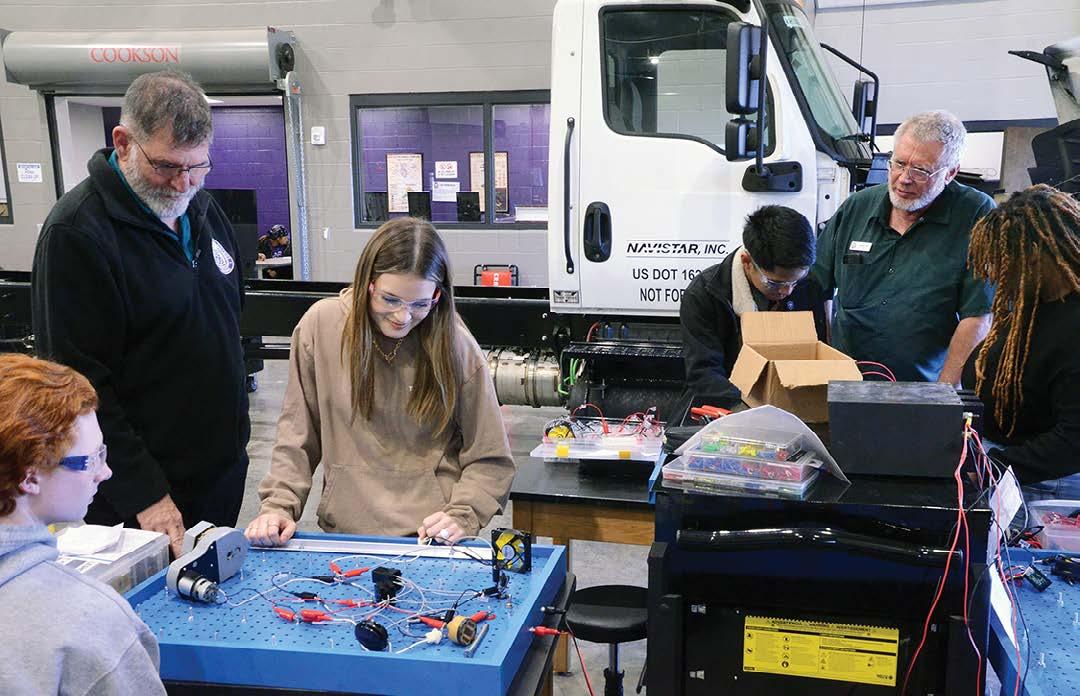
10 minute read
From Lonoke High to high-paying jobs
from March 2023
by ASBA
The Lonoke Business Academy is partnering with the Greenway John Deere dealership to prepare students directly for the company’s technician jobs. Other partnerships are helping students get ready to work as diesel mechanics, in agriculture, and as rural health care workers.
By Mattie Brawner Contributing writer
A partnership between the Lonoke School District and the Greenway John Deere dealership will prepare Lonoke High School students for agricultural technician jobs that will pay them $40,000-plus a year when they graduate. It’s part of a larger program where students are learning workforce skills with help from community partners. And it’s all the result of a millage campaign led by a patron who became a school board member.
Family-owned Greenway, which operates 27 dealerships in Arkansas and five in southeastern Missouri, is investing $1.5 million in the program, while the Arkansas Office of Skills Development provided a $1.2 million grant. The state grant was announced by Gov. Sarah Sanders at the Lonoke Business Academy – Carver Campus Feb. 3.
Students will spend 2.5 hours a day in the classes and will earn air-conditioning, computer diagnostics, hydraulics and electrical certifications. They’ll train on tractors and harvesting systems including combines, hay bailers and cotton pickers. Greenway’s investment will pay for equipment, tools and the instructor. It designed the curriculum.
Jared Field, Greenway training manager, said in an interview that the certification process for adult trainees normally lasts about two years. Lonoke students will undergo most of that training during their junior and senior years.
Once they graduate, they’ll train another three months and become John Deerecertified technicians. Then they’ll be ready for jobs that start at $40,000 plus monthly performance bonuses. Salaries can increase significantly within a year or two.
Field said the company created the program to benefit the community and to bolster its own workforce.
“Any given moment, we’re looking for at least 30 service technicians, and so there’s always space within our shops,” he said. “For kids that are not interested in going to post-secondary education, this is an opportunity to grab them while they’re in high school, get them up to speed educated to where they can roll out and immediately be as effective as one of our service technicians who’s been with us for several years.”
Superintendent Jeff Senn said Lonoke is the first school in Arkansas to be affiliated with John Deere and one of only two in the country. He said the district wanted to work with a local employer and wanted to provide opportunities and direction for its students.
The two-year program will start this fall and be limited to 24 students who will undergo an application and interview process with Greenway before being accepted. Students must be on course to graduate. The company wanted to limit the classes to 24 students, half in the morning and half in the afternoon, so they can receive more hands-on instruction. Field said students will be trained on up-to-date technology.
“Autonomy is coming real soon in John Deere tractors,” he said. “Those tractors are out there. They’re floating around right now. So we’ll bring some of that latest and greatest. As it filters into our area, we’ll bring autonomy into these shops so that they can see autonomous tractors.”
Field said students who discover they don’t want to be service technicians will gain skills they can use elsewhere in the company, such as in the parts department. Classes their senior year will cover John Deere communications and computer processes. They also can find employment working for other companies in the agriculture or diesel mechanic fields if they decide not to work for Greenway.
The $1.2 million state grant will pay for tools and equipment requested by Greenway. Gov. Sanders said the program is unique now but can be replicated elsewhere.
“I spent about two years on the campaign traveling all over the state,” she said. “Every single corner that I went to, every region, every business leader I met with, everybody had the same problem: They could not find skilled, qualified workers fast enough, and so what is happening here today is changing the game, changing the dynamic of what really building a skilled, qualified workforce looks like.”
Lonoke Business Academy
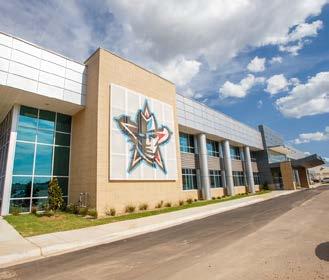
The program will be housed in the 30,000-square-foot Lonoke Business Academy – Carver Campus. The building houses classes on agriculture and aquaculture, diesel mechanics, industrial technology, and health professions.
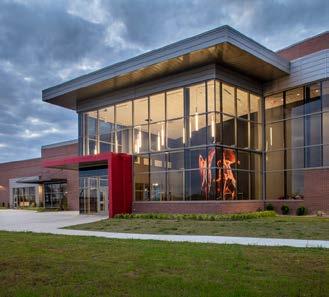

To receive funding from the Arkansas Office of Skills Department, districts must have a partnership, such as with a local university. For agriculture classes, Lonoke partnered with Arkansas State University – Beebe. Five of the six instructors are ASU employees, and one is a Lonoke High School employee. Through the diesel mechanics program, students can earn concurrent credit hours with ASU – Beebe. Senn said 50-60 students are involved in those classes now. The Greenway program differs from that program in that it does not offer concurrent credit and has an agriculture focus. Field said Greenway decided to work with Lonoke after the school district approached the company. The district already had built the facility and had done the heavy lifting.
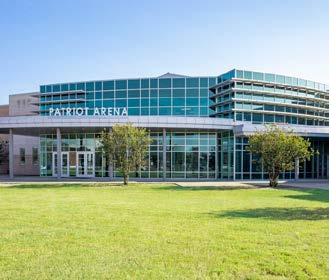
Senn said about 30%-35% of Lonoke graduates attend college, and that schools have been too focused on academia and not enough on students entering the workforce. At the grant announcement, he told attendees that about six years ago when he worked at another district, he took his car to a repair shop and saw that a recently graduated student would be working on it. When Senn asked him how he had learned to fix cars, the young man replied “YouTube.”
That bothered him.
“I thought how much I had failed him trying to make him do history and science and all these other things and prepare him for post-secondary ed, and I didn’t do anything to help him for the job that he had taken,” he said. He added half-jokingly that “[He] was going to work on my car, and I didn’t know that I trusted him at that point.”
It’s called the Lonoke Business Academy – Carver Campus after a discussion with alumni of the George Washington Carver Black School, which was once located behind where the business academy now stands. They had been told a school eventually would be named after their school, which had been dismantled after integration. Part of the educational building is sectioned off with two rooms accessible to the community after school hours but with no access to classrooms. It contains the George Washington Carver Multicultural Room and the Chris James Auditorium. James was a beloved former school board member who died of cancer in 2013.
Passing the millage
The academy was built after the district passed a 2.5-mill increase in March 2020 that was spearheaded by future school board member Elizabeth Anderson and her husband, Jamie.
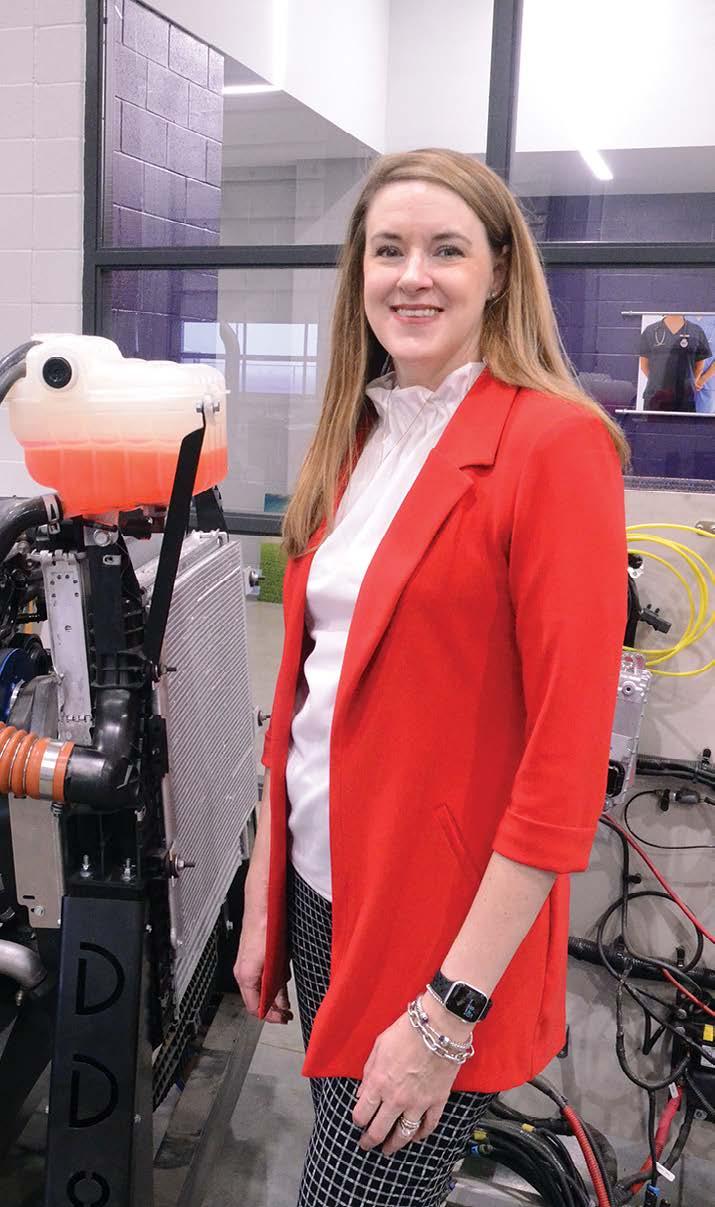
The two were approached by thenSuperintendent Dr. John Tackett with the idea to start a business school on campus. In 2019, after being denied state funds, they realized it would require a millage increase, which they knew would be hard to pass.
“We are the highest millage rate pretty much in our co-op, so it was really hard to pass a millage. … But we’re just thankful our community got behind it and passed it,” Anderson said. “I remember [we told them] it was a cup of coffee a day.”
The milage passed with 67% support on March 3, 2020, just two weeks before schools shut down for COVID. It increased the millage rate from 43 mills to 45.5 mills, which raised $12 million. The new 30,000-square-foot building was completed in 2021, and the number of students enrolled has already more than doubled this year.

Anderson took it upon herself to run the campaign.
“Basically I went to every community event,” she said. “I went to Sunday school classes; I went to churches; I went to Chamber meetings and Lions’ Club and Century League Clubs and any type of group organization I could attend. I attended political events because it was during the elections just to be able to meet with people and explain to them the importance of educating our kids and preparing them for the workforce here, that’s available here.”
One of the biggest challenges was getting local farmers on board. Most own large amounts of land and assumed their taxes would increase significantly. But farmland is taxed differently than personal property is. Anderson is a bank executive with Farmers Bank and Trust, while Jamie has a farm in Lonoke County, so the Andersons could speak their language.
“I’d have a farmer saying ‘I don’t want my taxes [raised],’’ she said. “I’d pull his public record, calculate it for him and send it to him or go knock on his door and say, ‘I just wanted to let you know, it’s only going to cost you about $250 a year, plus you’re providing agriculture students to be a part of the community.’ So, once you explained that and sold it to them, it was an easy sell.”
Anderson and her husband both were public school educated. She graduated from Magnolia, while he graduated from Lonoke.
“So, it was really important for us, if we were going to continue to send our kids to public schools, that we provide those platforms and educational opportunities for all kids, not just our own.” Anderson said.
After the millage passed, Anderson was appointed to the school board in 2021 and elected last year.
The millage increase paid for the building but not the equipment inside of it. Anderson said she called everyone from the Arkansas Trucking Association to Baptist Health to raise money. Many of the items in the school were then donated, or the money was donated to buy them. The school was stocked with tractors, drones donated by Bayer, and a $500,000 diesel simulator thanks to a grant from Cummins. A diesel truck with only 4,000 miles on the odometer was donated. Anderson said one of the district’s biggest challenges is making sure the students are working with current technology, which means the district says “no” to old, obsolete trucks and tractors.
Anderson said that as a banker and not a mechanic, she didn’t really know what equipment was needed. To fill in the gaps, she relied on Ken Calhoun, board chair for the Office of Skills Development and a trucking industry executive.
“He’s kind of my secret weapon,” she said, “because I’m a banker by trade, so I don’t know anything about diesel technology or the equipment needed or even what is obsolete and what’s not. ... He will call me and say ‘What do you think about this?’ and I’ll say ‘That sounds great’ and he’ll apply for the grants. He’ll send me the information, we’ll read through it together, and then he will actually get it.”
The school also offers agriculture and aquaculture studies. The program teaches welding, crop planning, drone controls, hydroponics, and animal husbandry. Students must come feed the animals and maintain their pens, even on weekends and breaks.
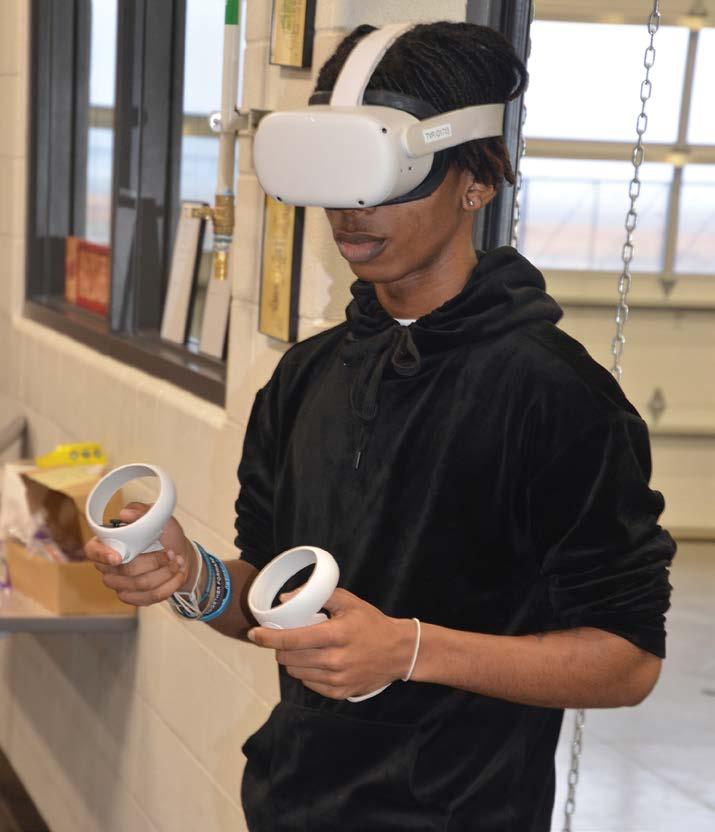
“When you have animal science, one cool thing about it is your school, instead of being nine months, it becomes year round,” Anderson said. “Because even during Christmas the students have to learn the responsibility of who’s taking care of the animals. Just like any other job, it kind of creates some responsibility.”
Aquaculture is a huge industry in Lonoke County, so the classes meet a critical workforce need. The aquaponics lab will house several species of fish when it opens in March and is connected to the greenhouse. Aquaculture students will meet with Anderson’s husband, Jamie, at his fish farm, I.F. Anderson Farms, to learn about his business. Anderson said she sees his struggles to find workers for his business.
On-site medical clinic
The school leases an on-site medical building to Baptist Health Family Clinic that houses both a community clinic and a clinic for the students to learn nursing skills. The district partnered with Baptist Health – University of Arkansas for Medical Sciences Medical Education Program and ASU – Beebe to create the curriculum. Lonoke’s one medical doctor, Dr. Les Anderson, moved his office into the clinic. Students taking medical classes can shadow the clinic’s medical professionals. They can graduate from
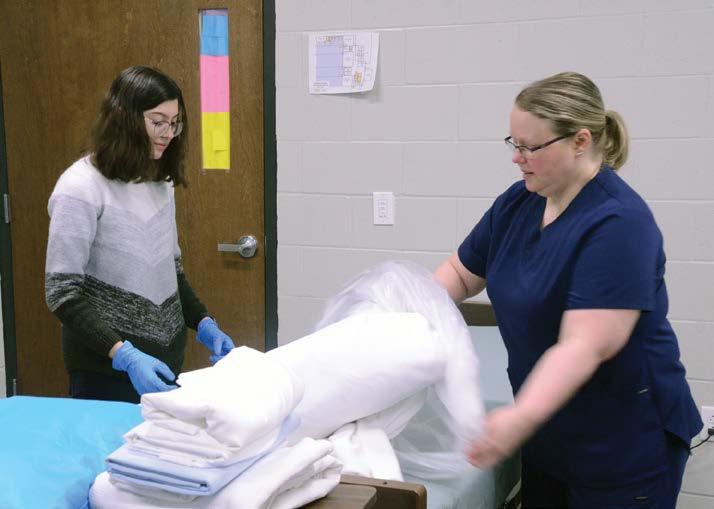
Lonoke High School as certified nursing assistants and fast track through ASU –Beebe’s LPN program. The lab includes a mini-pharmacy, and the students learn how to use IVs.
Anderson said the medical school is preparing students to work in a rural environment. Rural healthcare is different than urban healthcare in that providers must know every aspect of care, she said.
“We have one doctor in Lonoke, and he will tell you that somebody might walk in today that’s eight months pregnant that doesn’t know they’re eight months pregnant,” she said. “Tomorrow it may be somebody who just walked in to see the doctor and they’re having a massive heart attack, whereas in urban areas they typically go straight to the ER for those types of things. As you get more rural, the doctor is the closest thing.”
One of the benefits of having the onsite medical clinic is that in addition to providing training for the students, the Baptist Health – UAMS program sends up to five residents each day to train in rural healthcare.

“Through this program, we now have a pediatrician that sits on the sidelines of our football games, which is really a great asset to have,” Anderson said. “You go to a volleyball game, and there’ll be a resident doctor sitting there, and lot of smaller school districts just don’t have that type of asset.”
There are practical, everyday benefits to the program. One day, Anderson received a phone call at work alerting her that her son had possibly broken his thumb at football practice. By the time she arrived at the school from Little Rock, he had already seen the doctor, had an x-ray, and learned that his thumb was only sprained.
All of this has been made possible by the school district’s partnerships – with the state, with Greenway, with medical providers and others. The district isn’t stopping there. It hosts a business education meeting twice a year in which it invites local business owners and CEOs to discuss how the school district could prepare students to be able to work for them.
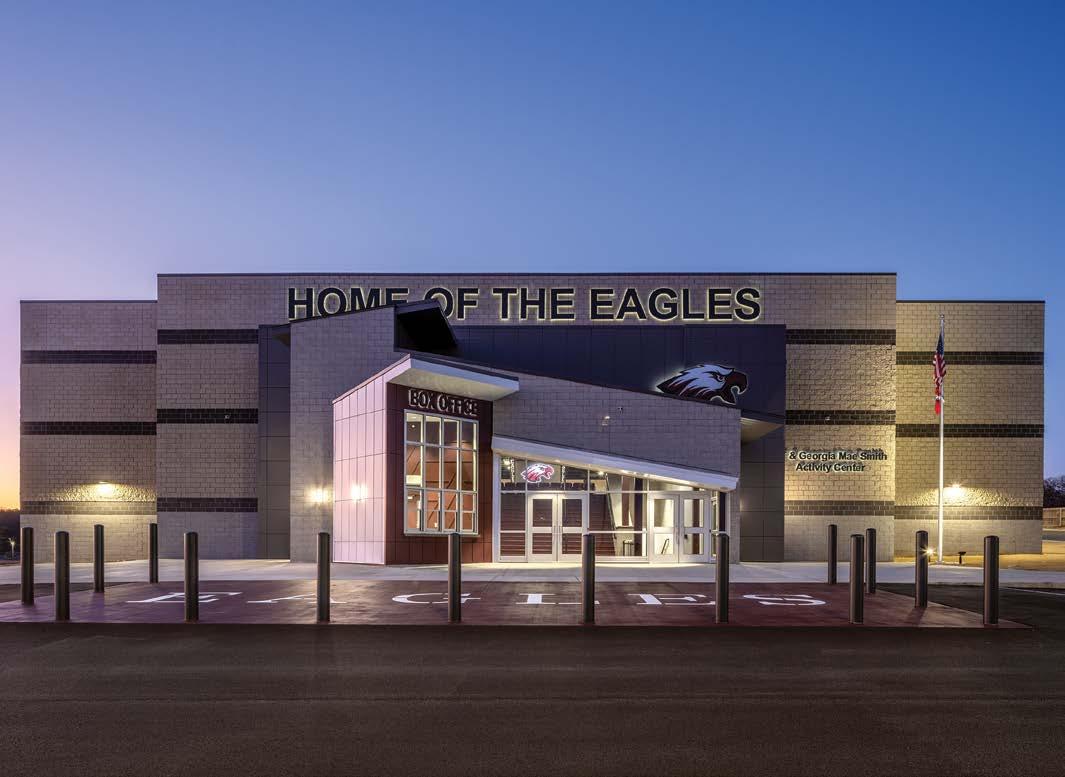
“I’m a huge proponent when it comes to public education that you have to have your community engaged, because you know your public schools filter into your local economy; they’re providing the workforce for your local economy,” Senn said. “So, if you’re not training these kids to actually go into the workforce that your community provides, then you’re doing a disservice to the students and to your community.
“They’re the taxpayers. They’re the ones that fund the schools, and so it only makes sense that you train these kids in preparation for jobs that are available for here. Otherwise, they’re going to pack up and move and go somewhere else, so you’re not creating economic development.”









